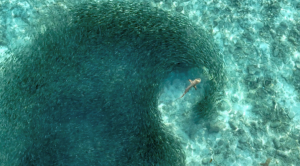 All known intelligent systems are collectives. Individual organisms are collectives of cells, which develop, heal, sense, and act. Groups of human and non-human animals use a range of mechanisms to coordinate their behavior across space and time, from flocks and swarms to organizations, institutions, and cultural traditions. The brain is a collective of highly coupled and dynamic excitable cells. Deep learning—the dominant approach to artificial intelligence—gains its power from combining simple units into complex architectures; many contemporary architectures combine multiple learners, and multi-agent settings are a critical frontier for AI, especially settings that integrate human and artificial agents.
All known intelligent systems are collectives. Individual organisms are collectives of cells, which develop, heal, sense, and act. Groups of human and non-human animals use a range of mechanisms to coordinate their behavior across space and time, from flocks and swarms to organizations, institutions, and cultural traditions. The brain is a collective of highly coupled and dynamic excitable cells. Deep learning—the dominant approach to artificial intelligence—gains its power from combining simple units into complex architectures; many contemporary architectures combine multiple learners, and multi-agent settings are a critical frontier for AI, especially settings that integrate human and artificial agents.
These examples imply that a scientific understanding of intelligence must grapple with collective intelligence—in a much broader sense than typical usage of the term would suggest. A variety of mathematical and computational models have been developed to explain and design intelligent behavior in particular collectives. Several mathematical fields provide the ideas behind these models, from dynamical systems, statistical mechanics, network science, and random matrix theory to information theory, optimization, Bayesian statistics, theories of self-assembly and self-organization, game theory, and category theory.
This workshop will bring together leading experts in the mathematical modeling of collective intelligence. While the workshop will explore collective intelligence in many different systems, substrates (both natural and artificial), and scales, it will focus on three broadly applicable modeling frameworks: dynamical systems, which have been applied to systems as various as brains and insect swarms; statistical physics, which has illuminated the behavior of flocking birds and deep learning architectures; and game theory, which has been applied to animal, human, and AI collectives. The collective intelligence domain cultivates the further development of formal tools for treating compositionality; the emergence of new capacities and collective degrees of freedom at multiple scales; and the higher-level institutions that coordinate the intelligent behavior of lower-level parts.
Iain Couzin
(Max Planck Institute of Animal Behavior)
Pranab Das
(Elon University)
Jessica Flack
(Santa Fe Institute)
Govind Menon
(Brown University)
Orit Peleg
(University of Colorado Boulder)